- Home
- Charles de Lint
The Little Country
The Little Country Read online
Praise for The Little Country by Charles de Lint
“A milestone in contemporary fantasy. This book sings. You grip the pages till your hands lock in place, or turn them so fast you accidentally tear them out. . . . De Lint’s career can no longer be described as promising; he has fulfilled his promise; he has arrived.”
—Orson Scott Card
“The author of Moonheart. . . asserts his unique ability to weave together a seamless pattern of magic and realism as this story-within-a-story unfolds with unique grace. Highly recommended.”
—Library Journal
“His ability to fuse the mundane with the strange is certainly very much of a gift. This reminded me of that long-ago book, Mistress Masham’s Repose, by T. H. White. I was certainly swept into another and very fascinating world page by page and was aware of an unusual and very forceful gift.”
—Andre Norton
“Really original: one of the most fascinating books of this decade. No hackneyed werewolves or vampires, but a real sense of wonder.”
—Marion Zimmer Bradley
“Excellent. . . Magical, mysterious, mystical. Frighteningly weird.”
—Chicago Sun-Times
By Charles de Lint from Tom Doherty Associates
DREAMS UNDERFOOT
THE FAIR AT EMAIN MACHA
FORESTS OF THE HEART
GREENMANTLE
INTO THE GREEN
THE IVORY AND THE HORN
JACK OF KINROWAN
THE LITTLE COUNTRY
MEMORY AND DREAM
MOONHEART
MOONLIGHT AND VINES
SOMEPLACE TO BE FLYING
SPIRITWALK
SVAHA
TRADER
YARROW
The Little Country
Charles de Lint
A Tom Doherty Associates Book
New York
for
Don Flamanck and Colin Wilson
two wise Cornishmen
and for all those traditional musicians
who, wittingly or unwittingly,
but with great good skill,
still seek to recapture that first music
Acknowledgments
Grateful acknowledgments are made to:
Robin Williamson for permission to use a portion of “Five Denials on Merlin’s Grave” from the book of the same title published by Pig’s Whisker Music Press; copyright © 1979 by Robin Williamson. For further information on Robin Williamson, write: Pig’s Whisker Music Press, P.O. Box 27522, Los Angeles, CA 90027; or Pig’s Whisker Music Press, BCM 4797, London WC1N 3XX, England.
James P. Blaylock for the use of the quote from Land of Dreams, Arbor House; copyright © 1987 by James P. Blaylock.
Paul Hazel for the use of the quote from Undersea, Atlantic, Little, Brown; copyright © 1982 by Paul Hazel.
Carrie Fisher for the use of the quote from Postcards from the Edge, Simon and Schuster; copyright © 1987 by Carrie Fisher.
Margaret Mahy for the use of the quote from Memory, J. M. Dent & Sons; copyright © 1987 by Margaret Mahy.
Hilbert Schenck for the use of the quote from Chronosequence, Tor; copyright © 1988 by Hilbert Schenck.
Tom Robbins for the use of the quote from Jitterbug Perfume, Bantam; copyright © 1984 by Tibetan Peach Pie Incorporated.
Susan Palwick for the use of the quote from “The Last Unicorn: Magic as Metaphor,” which first appeared in The New York Review of Science Fiction, February 1989; copyright © 1989 by Dragon Press, reprinted by permission of the author.
Russell Hoban for the use of the quote from The Medusa Frequency, Viking; copyright © 1987 by Russell Hoban.
Matt Ruff for the use of the quote from Fool on the Hill, Atlantic Monthly Press; copyright © 1988 by Matt Ruff. Ian Watson for the use of the quote from “The Mole Field,” The Magazine of Fantasy and Science Fiction, December 1988; copyright © 1988 by Mercury Press Inc., reprinted by permission of the author.
Robert Holdstock for the use of the quote from Lavondyss, Victor Gollancz Ltd., 1988; copyright © 1988 by Robert Holdstock.
Colin Wilson for the quote from Beyond the Occult, Bantam Press, 1988; copyright © 1988 by Colin Wilson.
Jack Dann for the quote from “Night Meetings,” Velocities: A Magazine of Speculative Poetry #4, Summer 1984; copyright © 1984 by Jack Dann; all rights reserved; reprinted by permission of the author.
Author’s Note
The novel that follows is a work of fiction. All characters and events in this book are fictitious and any resemblance to actual persons living or dead is purely coincidental.
The tune titles heading each chapter are all traditional, except for “Leppadumdowledum,” which was composed by Donal Lunny; “So There I Was,” composed by John Kirkpatrick; and “Absurd Good News.” Musicians interested in tracking down the tunes should look for them in the usual sources—tunebooks, old and new, but especially in the repertoire of musicians, whether recorded or in live performance and sessions; those tunes credited to Janey Little have been transcribed and can be found in the appendix at the end of the novel for the hopeful enjoyment of interested players.
A work such as this doesn’t grow out of a vacuum. The Little Country had its origin in sources too exhaustive to list with any real thoroughness, but I can still pinpoint its original spark: many an evening in the early seventies spent listening to my friend Don Flamanck telling stories of Cornwall as he remembered it. When my wife, Mary Ann, and I finally went to Cornwall in October of 1988 to research this book’s settings, we found it to be everything Don had promised it would be, and more.
Thanks are due to Don, first and foremost, for that inspiration, and also to Phil and Audrey Wallis of Mousehole for more wonderful stories and their hospitality; to Bernard Evans of Newlyn for filling me in on the local music scene; to Ben Batten, Christopher Bice, Des Hannigan, John Hocking, Robert Hunt, John and Nettie Pender, Derek Tangye, Douglas Tregenza, Ken Ward, G. Pawley White, and a multitude of others too numerous to list here for background material; to Colin Wilson for his logical explorations of those things that defy logic; to those many, many traditional musicians, again too numerous to mention, who keep the music alive and give it new life with each note they play; to those musicians who attend the local music sessions here in Ottawa (“All of a Monday Night”) and by their enthusiasm keep my own playing in right good fettle; and last, though not least, to my wife, Mary Ann, a mean mandolin player in her own right, for her support, both musical and literary, and for her love that I could not do without.
—Charles de Lint
myself, a brat who . . .
couldn’t figure numbers worth a damn
was always a chancer
and given three lines to add I’d put the middle row
down as the answer
but I could read all day if I could get away with it
and all night too with a flashlight under the covers
of that Green Man . . . or of Merlin of the borders. . . .
—ROBIN WILLIAMSON,
from “Five Denials on Merlin’s Grave”
He wanted the sort of book that didn’t seem to need a beginning and end, that could be opened at any page without suffering for it—slow, candlelight reading.
—JAMES P. BLAYLOCK,
from Land of Dreams
PART ONE – The Hidden People
Man has closed himself up, till he sees all
things through the narrow chinks of his cavern.
—WILLIAM BLAKE
Underneath the reality in which we live and
have our being, another and altogether
different reality lies concealed.
—FRIEDRICH NIETZSCHE
Like burrs old names get stuck to each other and to anyone who walks among them.
—PAUL HAZEL, from Undersea
There were two things Janey Little loved best in the world: music and books, and not necessarily in that order.
Her favorite musician was the late Billy Pigg, the Northumbrian piper from the northeast of England whose playing had inspired her to take up the small pipes herself as her principal instrument.
Her favorite author was William Dunthorn, and not just because he and her grandfather had been mates, though she did treasure the old sepia-toned photograph of the pair of them that she kept sealed in a plastic folder in her fiddle case. It had been taken just before the Second World War in their native Mousehole—confusingly pronounced “Mouzel” by the locals—two gangly Cornish lads standing in front of The Ship Inn, cloth caps in hand, shy grins on their faces.
Dunthorn had written three book-length works of fiction, but until that day in the Gaffer’s attic when Janey was having a dusty time of it, ferreting through the contents of old boxes and chests, she knew of only two. The third was a secret book, published in an edition of just one copy.
The Hidden People was his best-known work, remembered by most readers with the same fondness that they recalled for Winnie the Pooh, The Wind in the Willows, and other classics of their childhood. It told of a hidden race of mouse-sized people known as the Smalls, reduced to their diminutive stature in the Middle Ages by a cranky old witch who died before her curse could be removed. Supposedly the Smalls prospered through the ages, living a hidden life alongside that of more normal-sized people right up to the present day. The book was still in print, in numerous illustrated editions, but Janey’s favorite was still the one that contained Ernest Shepard’s delightful pen and ink drawings.
The other novel was The Lost Music, published two years after the first. While it didn’t have nearly the success of The Hidden People—due no doubt to its being less whimsical and the fact that it dealt with more adult themes—its theories of music being a key to hidden realms and secret states of mind had still made it a classic in the fantasy field. It too remained in print, though there were few children who would find a copy of it under their Christmas tree, illustrated by whichever artist was currently the nadir of children’s book illustrating.
Which was really a pity, Janey often thought, because in the long run, The Lost Music was the better book. It was the reason that she had taken up with old things. Because of it, she went back to its sources, poring over folktales and myths, discovering traditional music and finding that the references between old lore and old tunes and songs went back and forth between each other. It was a delightful exploration, one that eventually led to her present occupation.
For while she had no interest in writing books, she had discovered, hidden away inside herself, a real flair for the old music. She took to playing the fiddle and went wandering through tunebooks tracked down in secondhand bookshops, the tunes sticking to her like brambles on a walk across a cliff-side field. Old tunes, old names, old stories. So Dunthorn was partially responsible for who she was today—a comment that made the Gaffer laugh when she mentioned it to him once.
“Wouldn’t Billy smile to hear you say that now, my robin,” her grandfather had said. “That his writings should turn a good Cornish girl to playing Paddy music for a living—not to mention traveling around by her ownsel’ with nothing but a fiddle and a set of Scotch small pipes to keep her company.”
“You like my music.”
The Gaffer nodded. “And I don’t doubt Bill would have liked it too—just as he liked his own writing. He’d sit up and scribble by the lantern till all hours of the night sometimes—took it all very seriously, didn’t he just?—and he’d have admired your getting by with the doing of something you love.
“He always wanted to live by his writing—writing what he pleased, I mean—but all the bookmen wanted was more fairy tales. Bill . . . he had more serious stories to tell by then, so he worked the boats by day to earn his living and did his writing by night—for himself, like. He wouldn’t give ’em another book like the one about the Smalls. Didn’t want to be writing the same thing over and over again, was what he said.”
“The Lost Music has fairy-tale bits in it.”
“And doesn’t it just, my beauty? But to hear him talk, they weren’t made-up bits—just the way that history gets mixed up as the years go by. The Lost Music was his way of talking about the way he believed that old wives’ tales and dance tunes and folktales were just the tangled echoes of something that’s not quite of this world . . . something we all knew once, but have forgotten since. That’s how he explained it to me, and very serious he was about it too. But then Bill had a way of making anything sound important—that was his gift, I think. For all I know he was serious about the Smalls too.”
“You think he really believed in things like that?”
The Gaffer shrugged. “I’m not saying yes or no. He was a sensible lad, was Bill, and a good mate, but he was a bit fey too. Solid as the ground is firm, but ever so once in a while he’d get a funny look about him, like he’d just seen a piskie sticking its little brown head around the doorpost, and he wouldn’t talk then for a while—at least he wouldn’t say much that made sense. But I never heard a man not make sense so eloquently as Bill Dunthorn could when he was of a mind to do so, and there was more than once he had me half believing in what he was saying.”
Dunthorn had also written essays, short stories, travelogues, and poetry, though none of those writings survived in current editions except for two of the short stories, which were constantly being reprinted in storybook collections for children: “The Smalls,” which was the original version of The Hidden People, and “The Man Who Lived in a Book,” a delightful romp about a world that existed inside a book that could be reached by placing a photograph of oneself between its pages. Janey could still remember all the times she’d put pictures of herself between the pages of her favorite books, in the very best parts, and gone to sleep, hoping to wake up in one of those magical realms.
“I could use that trick now,” she murmured to herself as she brushed the dust and cobwebs from a chest that was thrust far back under the eaves of the attic.
She still couldn’t believe that Alan had left her in the lurch, right on the eve of a new tour of New England and California.
Things had not been going well between them this past summer, which just went to show you that one should pay more attention to the old adages because they were all based on a kernel of good solid common sense.
Never mix business and pleasure.
Well, of course. Except having a relationship with one’s sideman seemed too perfect to not take advantage of it. Instead of leaving your lover behind, he went on tour with you. What could be better? No more lonely nights while your sideman went out with some guitar groupie and you were left alone in the hotel room because you just wanted to be away from the crowds for a change. Away from strangers. Away from having to put on a smiling face when you just wanted to be silly with a friend, or slouch in a corner and simply do nothing at all, without having to worry about what kind of an impression you made or left behind when you traveled on.
But relationships tended to erode if they weren’t worked on, and Alan’s and hers had been no exception. They’d become grouchy with each other on their last tour of the Continent. Complaining, not with each other, but about each other. Mostly it was just little things, dissatisfactions and petty differences, but it began to affect the music until it got to the point where they couldn’t work up a new arrangement of any sort without a row.
Argumentative was how Alan described her.
Perhaps she was. But she wouldn’t see the music compromised. Improvising was fine, but not simply because he couldn’t bother to remember an arrangement. And banging his guitar strings like they were horseshoes and his pick the hammer, that
was right out. It was still her name on the tour posters. People came to see her play the music, and she meant to give them their money’s worth. They hadn’t come to see her sideman get soused and have evenings where he made the Pogues sound like brilliant musicians.
And that was the real heart of Alan’s problem. They hadn’t come to see Alan MacDonald; they’d come to see her.
“Oh, sod him,” she said as she dragged the dusty chest out from under the eaves.
Her voice rang hollowly in the attic. She wondered what the Gaffer would think to hear her sitting up here, talking to herself, but she had the house to herself. He was up in Paul, at the King’s Arms, having a few pints with his mates. Perhaps she should have gone. Chalkie Fisher would be there and if he’d brought along his box, they could have had a bit of a session. And after a few tunes, Jim Rafferty would take out his wee whistle and ask quietly, “Do you know this one, then?” just before he launched into the version of “Johnny Cope” that was his party piece.
But for once Janey knew she’d find no solace in the music. Not with the tour still looming and her without a sideman. She had an advert in a couple of the papers, but she’d have to go back to Jenny’s flat in London for the auditions. If anyone even bothered to call. Knowing her luck, she’d end up being stuck with some three-chord wonder that she’d have to teach to play his bloody instrument before they could even start to work on their sets. Because everybody who was decent wasn’t available. Unless she wanted to go begging Alan to at least finish this one tour with her.

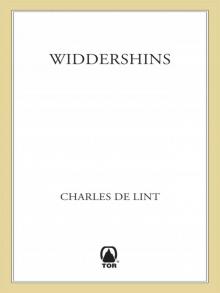 Widdershins
Widdershins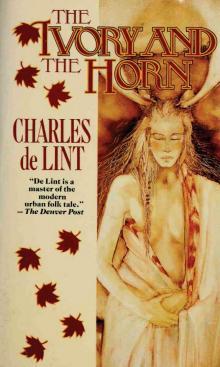 The Ivory and the Horn
The Ivory and the Horn Yarrow
Yarrow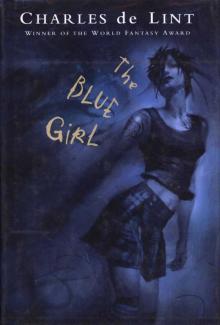 The Blue Girl
The Blue Girl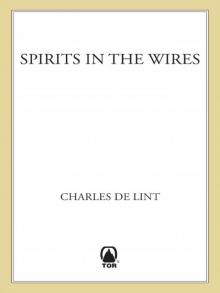 Spirits in the Wires
Spirits in the Wires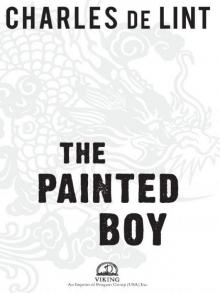 The Painted Boy
The Painted Boy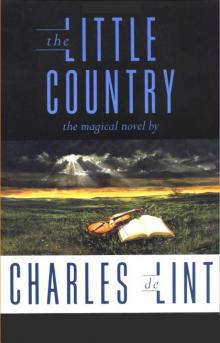 The Little Country
The Little Country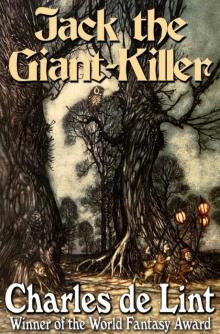 Jack of Kinrowan: Jack the Giant-Killer / Drink Down the Moon
Jack of Kinrowan: Jack the Giant-Killer / Drink Down the Moon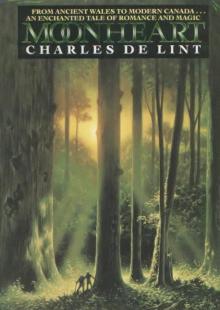 Moonheart
Moonheart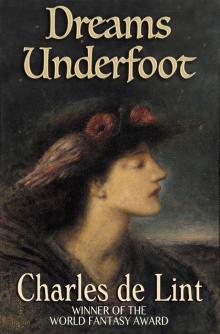 Dreams Underfoot
Dreams Underfoot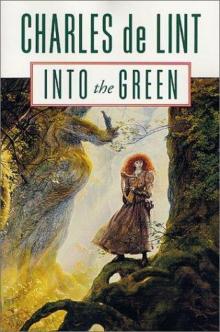 Into the Green
Into the Green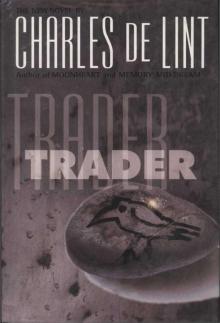 Trader
Trader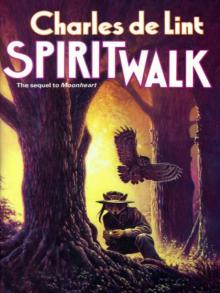 Spiritwalk
Spiritwalk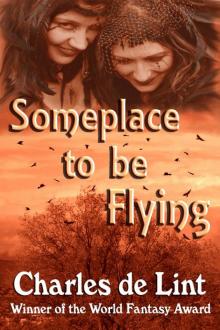 Someplace to Be Flying
Someplace to Be Flying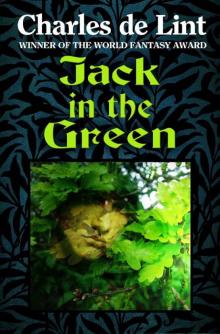 Jack in the Green
Jack in the Green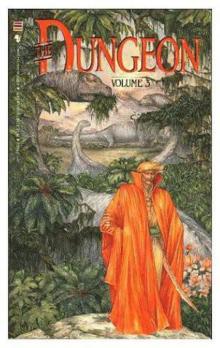 The Valley of Thunder
The Valley of Thunder Out of This World
Out of This World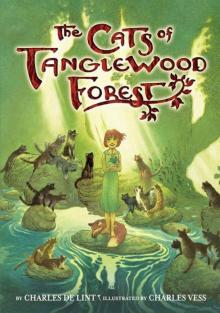 The Cats of Tanglewood Forest
The Cats of Tanglewood Forest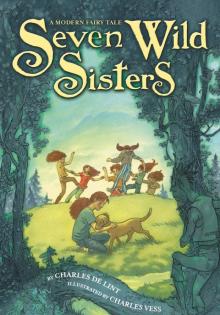 Seven Wild Sisters
Seven Wild Sisters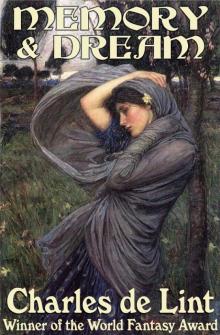 Memory and Dream
Memory and Dream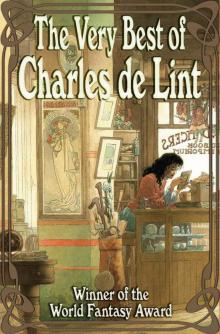 The Very Best of Charles De Lint
The Very Best of Charles De Lint Under My Skin
Under My Skin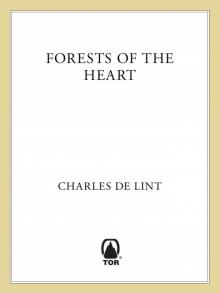 Forests of the Heart
Forests of the Heart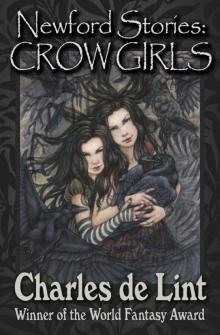 The Newford Stories
The Newford Stories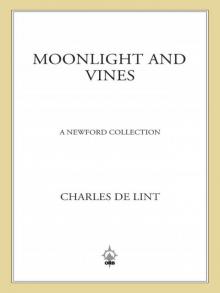 Moonlight and Vines
Moonlight and Vines Angel of Darkness
Angel of Darkness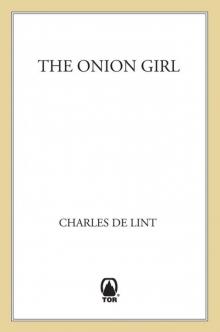 The Onion Girl
The Onion Girl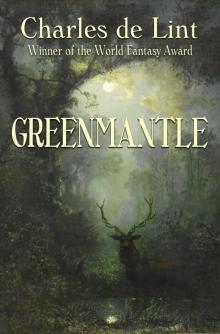 Greenmantle
Greenmantle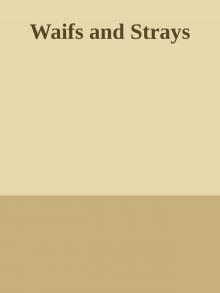 Waifs And Strays
Waifs And Strays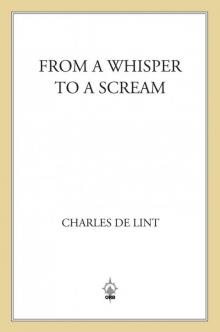 From a Whisper to a Scream
From a Whisper to a Scream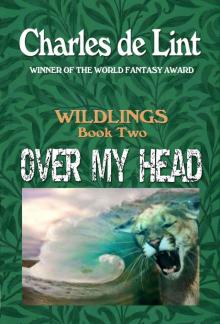 Over My Head
Over My Head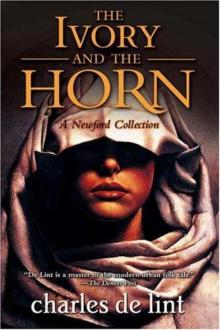 The Ivory and the Horn n-6
The Ivory and the Horn n-6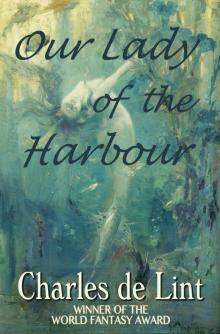 Our Lady of the Harbour
Our Lady of the Harbour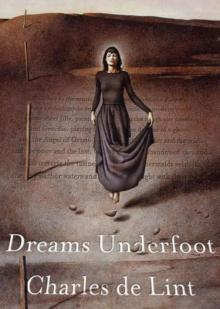 Dreams Underfoot n-1
Dreams Underfoot n-1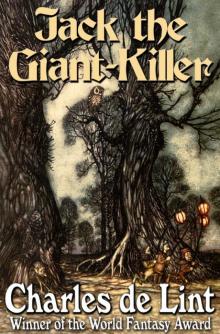 Jack the Giant-Killer (Jack of Kinrowan Book 1)
Jack the Giant-Killer (Jack of Kinrowan Book 1)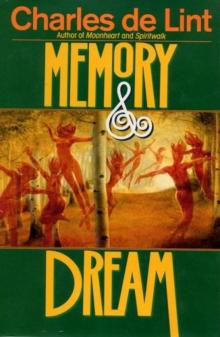 Memory and Dream n-5
Memory and Dream n-5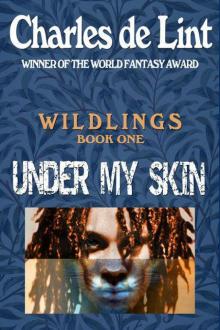 Under My Skin (Wildlings)
Under My Skin (Wildlings)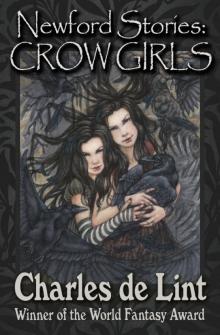 Newford Stories
Newford Stories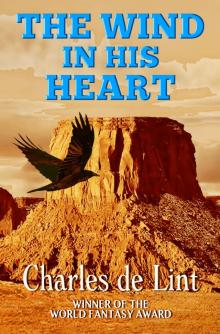 The Wind in His Heart
The Wind in His Heart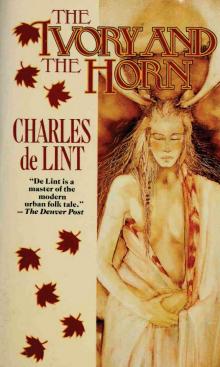 Ivory and the Horn
Ivory and the Horn